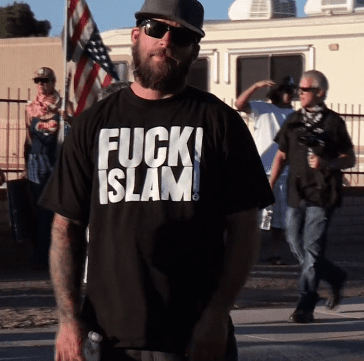So just imagine this happens to you, at your church. You arrive for the Sunday morning service and you’re greeted by 250 or so protesters. They’re shouting and angry and they carry guns — lots and lots of guns.
And just so there’s no mistaking the focus of their aggressive threats and anger, most of them are wearing T-shirts that say things like “F–k Christianity.”*
What do you do? Cancel church? Call the police? Run and hide? Arm your congregation for self-defense?
Well, if you’re Usama Shami, you invite them inside to join you in prayer.
For Shami, president of a mosque in Arizona, the above scenario wasn’t hypothetical. This is something that really happened to him and to his Phoenix congregation last Friday night. “Hundreds gather in Arizona for armed anti-Muslim protest,” reports Evan Wyloge for The Washington Post.
About 250 mostly armed anti-Muslim demonstrators — many wearing T-shirts bearing a profanity-laced message denouncing Islam — faced-off against a crowd of roughly the same size defending the faith in front of a Phoenix mosque Friday night.
Demonstrators yelled and taunted one another across a line of police separating the two sides but violence did not break out.
Jon Ritzheimer, the organizer of the protest, called it a patriotic sign of resistance against what he deemed the tyranny of Islam in America.
Two things.
First, this highlights the shallow pettiness of so much of the blather we’ve heard of late about “religious liberty” and the supposed “persecution” facing white evangelicals here in America. This doesn’t happen to white evangelical churches in America. But it is not unusual for mosques, or synagogues, or Pagan communities, or black Christian churches to face this kind of organized, aggressive opposition or these kinds of violent threats. Nor is it unusual for them to face actual violence. That’s a long, long history here in America — a pattern that runs through Birmingham and Murfreesboro and Houston.

Talk of religious liberty is poisonous nonsense unless it includes — and emphasizes — the rights of those whose religious liberty is most often denied and most often threatened. Otherwise we’re not talking about religious liberty at all — but about hegemony and white Christian supremacy.
Second, take a moment to consider the almost reckless courage shown here by Shami and his congregation. These protesters were angry and armed. It’s one thing to invite a hostile neighbor inside to join you, but it’s something else entirely when that person is waving a gun. Or when there are hundreds of angry people with guns.
Consider, also, the depth of hospitality involved in welcoming angry strangers wearing those “F–k Islam” T-shirts. They didn’t tell these strangers to come back some time, without the guns and without the deliberately offensive slogans on their clothing. They didn’t say, “Go home and change your shirt, and then you’re welcome to come back some day after you’ve calmed down.”
I don’t know what these protesters expected as a response when they showed up with their guns and their “F–k Islam” T-shirts, but whatever they expected it wasn’t that they would be greeted with, “Ah, you’re just in time for Friday prayers. Come inside, come inside.”
Such surprising hospitality proved to be, literally, disarming:
Jason Leger, a Phoenix resident wearing one of the profanity-laced shirts, accepted an invitation to join the evening prayer inside the mosque, and said the experience changed him.
“It was something I’ve never seen before. I took my shoes off. I kneeled. I saw a bunch of peaceful people. We all got along,” Leger said. “They made me feel welcome, you know. I just think everybody’s points are getting misconstrued, saying things out of emotion, saying things they don’t believe.”
Paul Griffin, who had earlier said he didn’t care if his t-shirt was offensive, assured a small crowd of Muslims at the end of the rally that he wouldn’t wear it again.
“I promise, the next time you see me, I won’t be wearing this shirt,” he told one man while shaking his hand and smiling. “I won’t wear it again.”
“Extend hospitality to strangers,” the Apostle Paul said. In the NIV translation, that verse is rendered “Practice hospitality.”
It takes practice. And, as Usama Shami and his congregation showed, sometimes it takes courage.
– – – – – – – – – – – –
* Or, depending on your particular sectarian or non- persuasion, a T-shirt reading “F–k Baptists,” or “F–k Catholicism,” “F–k Judaism,” “F–k Mormons,” “F–k Wicca,” or “F–k Atheism.” I single out Christianity in the hypothetical above — with its Sunday church services — because here in the American context, it is us Christians who most need to imagine such a scenario in a way that puts ourselves in the shoes of these Muslims in Arizona. And because nothing highlights the perverse absurdity of the persecuted hegemons like imagining the difference in how Fox News or Charisma magazine would react if 250 armed Muslims had surrounded a white Christian church in Phoenix.












